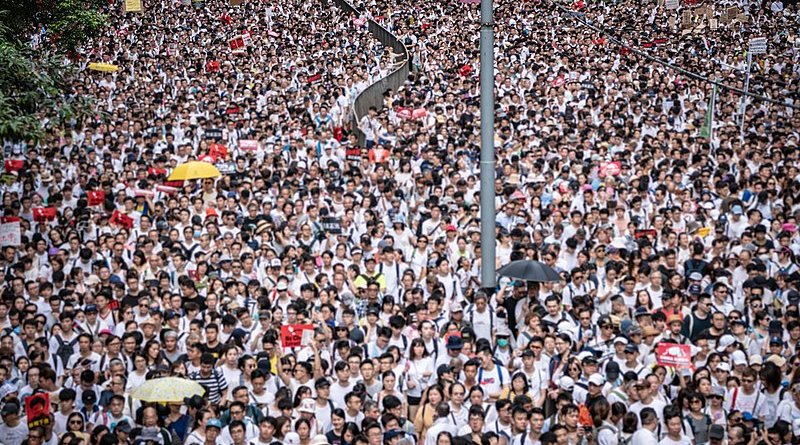China’s Hong Kong Quandary – Analysis
By Published by the Foreign Policy Research Institute
By Marvin C. Ott*
(FPRI) — Over recent weeks, Hong Kong has been repeatedly rocked by mass demonstrations protesting the actions of its governing authorities. What makes these demonstrations noteworthy and very important are their scale and their location. Protest organizers estimated the crowds at one point at nearly two million—over a quarter of the entire population of Hong Kong. These are not the first expressions of mass dissent in Hong Kong; the 2014 “Umbrella Movement” paralyzed the city for days. But in several respects, Hong Kong still seems an unlikely venue for such events.
When over a century of British colonial rule ended in 1997 and Hong Kong reverted to Chinese control, public opinion polls indicated that 83% of residents were positive or neutral regarding the change. The restoration of Beijing’s authority coincided with a period of rapid growth in China’s wealth and power. The last 22 years have been good to China and have produced growing pride and nationalist feeling among its citizenry. In 1997, Hong Kong was the wealthiest city in China. That is no longer the case because of the spectacular growth in Shanghai, Beijing, and Guangdong.
Moreover, residents of Hong Kong enjoy rights of free expression not available elsewhere in China. This is the product of the unique “one country; two systems” formula—to last for fifty years—agreed upon between China and Britain. So what is the problem?
The problem is that Hong Kong’s relative autonomy and the personal freedoms that go with it are deeply prized by the people who live there—and they are deathly afraid of losing them. As China has become rich and powerful, it has also become increasingly authoritarian. The implicit (even explicit) contract that the government has with its citizens is “keep quiet; don’t question Communist Party rule and in return you will have economic benefits and the pride of being part of a great power.” And it seems to be working. Occasional expressions of public dissent are ruthlessly suppressed, but Chinese—particularly in urban areas—live better today than they ever have. For the great majority, that seems to be enough.
However, it is not enough for the people of Hong Kong who have tasted the forbidden fruit of free speech and even a bit of political democracy. The Hong Kong Legislative Council is elected, but the slate of eligible candidates is tightly vetted by Beijing and the more powerful Chief Executive is appointed by Beijing. There is a garrison of Chinese troops in Hong Kong. They remain on base and are largely invisible—but everyone knows they are there. The Hong Kong police, originally trained by the British, are professional and show a modicum of respect for the rights of citizens—at least until now.
Meanwhile, large numbers of tourists from China enter Hong Kong on shopping sprees—and their behavior routinely reminds the people of Hong Kong how different they actually are. Recent public opinion polls conducted by the University of Hong Kong show that a growing proportion of Hong Kong residents identify themselves at “Hong Kongers” (53%) vice Chinese (11%).
The dark question hanging over Hong Kong is whether, and to what extent and for how long, China will continue to respect its “two systems” pledge? From Beijing’s perspective, Hong Kong is, in political terms, a dangerous place. Subjects like the Tiananmen massacre of 1989 are ruthlessly expunged from China’s media and school curricula, but in Hong Kong, there are large public commemorations.
As China, under Xi Jinping, has become increasingly totalitarian, the contrast with Hong Kong becomes increasingly glaring. Not surprisingly, Beijing has taken several steps to strengthen its influence, while asserting it has “comprehensive authority” over Hong Kong. Last month, the Hong Kong authorities (almost certainly at Beijing’s behest) proposed amendments to its extradition law that would allow the return to China of criminals who had fled to Hong Kong.
However, residents of Hong Kong saw a hidden agenda. Such a law could be used to arrest anyone in Hong Kong on any pretext and ship them off to China. There, they would face imprisonment or worse, not because they were criminals, but because their political views were unwelcome. In recent years, several Hong Kong booksellers have been disappeared to China apparently because some of their titles were deemed seditious. Under the proposed law, everyone in Hong Kong would be personally vulnerable to the Chinese “justice” system. It was fear that brought the population into the streets.
Yet, Beijing is fearful, too. The Communist Party portrays political democracy as an alien, Western idea that has no resonance in Chinese history and culture. Yet, Taiwan has built a thriving, multiparty democracy. South Korea, Mongolia, and Japan (all Sinicized cultures) have done the same.
For China’s leaders, the danger is undeniable. Xi has been adamant that the survival of the current regime under Communist Party control is his single overriding objective. Developments in Hong Kong are not just a concern; as a potential democracy contagion, they are a mortal threat. Hong Kong’s protest leaders need to understand that because they are in serious danger of overplaying their hand. By deliberately exposing Chinese tourists to their demands, they are effectively challenging Beijing. By rejecting the Chief Executive’s climb down on the law as insufficient, they are adopting an all-or-nothing posture that can only be read one way by Xi. In 1989, the students in Tiananmen did not know when to declare victory and leave the square. Instead, there was a bloodbath.
*About the author:
Source: This article was published by FPRI

